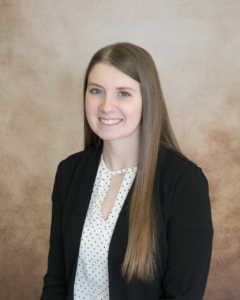
A historic bank in Coffeyville, Kansas.
By Darla Sikora, Citizens State Bank of Loyal
Here’s to hoping that this month’s From the Fields finds your customers finally able to be out in their fields after what seems like a particularly long winter and slow-to-arrive spring! How can it be that in just one more month, the year will already be half over?
With June Dairy Month quickly approaching, complete with its many June Dairy Breakfasts and the appreciation it brings for our ag producers, I am reminded of the words of well-known WGN Farm Broadcaster Orion Samuelson. At the 2013 ABA National Ag Banker Conference in Minneapolis, he told us that he ends each day with this prayer: “Thank you God, for America’s farmers and ranchers: the people who put the food on my table, clothes on my back, a roof over my head and energy in my tank.” There is no doubt our customers have strong work ethics as they strive to provide the food and fiber for the rest of us, but we too all work hard, day-in and day-out, year-in and year-out. For us, the work entails providing an array of ag banking products, programs, and services along with a great deal of guidance, analysis, and direction for the ag producers of the fine state of Wisconsin. With summer (finally!) around the corner, I just want to remind everyone to make sure to carve some time out this year, and every year, for yourselves.
It’s important to take time away from the job to get “out of our heads,” out of our “normal” and to step out into something else. Recently I enjoyed a family road trip to the state of Texas, via some interesting byways. Taking the “scenic route” we also saw much of small town America. It is always interesting to see the agriculture in other parts of the country; from massive farm fields, to rows and rows of grain bins, to longhorn cattle right on the outskirts of town, to the Southwest Dairy Museum, and to “Rancho” proudly displayed in the titles on overhead signs leading to Texas ranches.
Tying just a bit of banking into the vacation, on a quiet, cloudy Sunday morning we drove through rural Coffeyville, Kansas where 130 years ago on October 5, 1892, the Dalton Gang rode into town attempting to make outlaw history by robbing not one, but two banks simultaneously. They were unsuccessful and after a 12-minute gunfight, four of the six members lay dead. The storied shoot-out also claimed the lives of four of Coffeyville’s courageous townspeople who defended against the Dalton’s last raid. (Interesting note: In 1876 John W. Cubine helped put Coffeyville on the map by creating a cowboy boot that fit the left and right foot individually. Before this, all boots were constructed exactly the same and didn’t have a specific fit for each foot. Think of that the next time you pull on your Ariats! John’s nephew, George Cubine, and another employee of the boot shop, Charles Brown, were both killed defending Coffeyville on the day of the Dalton Raid.)
There is so much out there to learn, to see, to experience. Life is short. Moments are fleeting. Time is precious. Remember to set the busy-ness and the demands of the daily routine aside every now and again to take a break and to spend time with those who mean the most to you. Years ago, on another road trip, I saw a sign outside of a church near Escanaba, Michigan that read, “families go on vacation to become families again”. Take the road less traveled, step outside the usual, make the connections, laugh more, and embrace those you love with all your might.
Darla Sikora is senior vice president of agricultural banking with Citizens State Bank of Loyal, and currently serves as the Past Chair on the WBA Agricultural Bankers Section Board of Directors.

 First State Bank recently announced the promotion of Brian Wood to vice president – loan operations. In his new role, Wood will oversee all aspects of application, processing, and servicing of First State Bank’s loan portfolio while ensuring adherence to loan policy and regulatory compliance.
First State Bank recently announced the promotion of Brian Wood to vice president – loan operations. In his new role, Wood will oversee all aspects of application, processing, and servicing of First State Bank’s loan portfolio while ensuring adherence to loan policy and regulatory compliance.
 Last spring, Jenna Raisbeck was awarded the Wisconsin Bankers Foundation’s (WBF) Agricultural Banking Scholarship. Originally from Lancaster, Wisconsin, Raisbeck is now a junior at the University of Wisconsin–Platteville and holds a position as a credit analyst and branch marketing liaison at Community First Bank in Platteville.
Last spring, Jenna Raisbeck was awarded the Wisconsin Bankers Foundation’s (WBF) Agricultural Banking Scholarship. Originally from Lancaster, Wisconsin, Raisbeck is now a junior at the University of Wisconsin–Platteville and holds a position as a credit analyst and branch marketing liaison at Community First Bank in Platteville.



